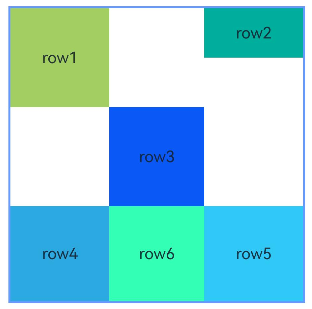harmony 鸿蒙相对布局 (RelativeContainer)
相对布局 (RelativeContainer)
概述
在应用的开发过程中,经常需要设计复杂界面,此时涉及到多个相同或不同组件之间的嵌套。如果布局组件嵌套深度过深,或者嵌套组件数过多,会带来额外的开销。如果在布局的方式上进行优化,就可以有效的提升性能,减少时间开销。请参考优化布局时间了解RelativeContainer相对于List,在布局时间上的性能提升。
RelativeContainer是一种采用相对布局的容器,支持容器内部的子元素设置相对位置关系,适用于处理界面复杂的场景,对多个子元素进行对齐和排列。子元素可以指定兄弟元素或父容器作为锚点,基于锚点进行相对位置布局。在使用锚点时,需注意子元素的相对位置关系,以避免出现错位或遮挡的情况。下图展示了一个 RelativeContainer的概念图,图中的虚线表示位置的依赖关系。
图1 相对布局示意图
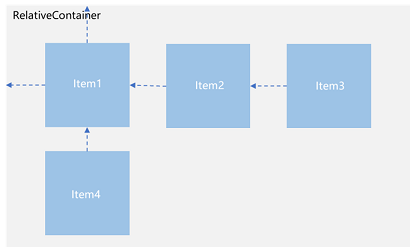
子元素并不完全是上图中的依赖关系。比如,Item4可以以Item2为依赖锚点,也可以以RelativeContainer父容器为依赖锚点。
基本概念
参考边界:设置当前组件的哪个边界对齐到锚点。
锚点:通过锚点设置当前元素基于哪个元素确定位置。
对齐方式:通过对齐方式,设置当前元素是基于锚点的上中下对齐,还是基于锚点的左中右对齐。
设置依赖关系
设置参考边界
设置当前组件的哪个边界对齐到锚点。容器内子组件的参考边界区分水平方向和垂直方向。
* 在水平方向上,可以按照起始(left)、居中(middle)或尾端(right)的组件边界与锚点对齐。当设置三个边界时,仅起始(left)和居中(middle)的边界设置生效。
 * 在垂直方向上,可以设置组件边界与锚点对齐,具体包括顶部(top)、居中(center)和底部(bottom)。当设置三个边界时,仅顶部(top)和居中(center)生效。
* 在垂直方向上,可以设置组件边界与锚点对齐,具体包括顶部(top)、居中(center)和底部(bottom)。当设置三个边界时,仅顶部(top)和居中(center)生效。

设置锚点
锚点设置涉及子元素相对于其父元素或兄弟元素的位置依赖关系。具体而言,子元素可以将其位置锚定到相对布局容器(RelativeContainer)、辅助线(guideline)、屏障(barrier)或其他子元素上。
为了准确定义锚点,RelativeContainer的子元素必须拥有唯一的组件标识(id),用于指定锚点信息。父元素RelativeContainer的标识默认为“__container__”,其他子元素的组件标识(id)则通过id属性设置。
说明:
- 未设置组件标识(id)的组件虽可显示,但无法被其他组件引用为锚点。相对布局容器会为其拼接组件标识,但组件标识(id)的规律无法被应用感知。辅助线(guideline)与屏障(barrier)的组件标识(id)需确保唯一,避免与任何组件冲突。若有重复,遵循组件 > guideline > barrier 的优先级。
- 组件间设置锚点时应避免形成依赖循环(组件之间设置链除外),依赖循环将导致子组件缺乏定位基准,最终无法绘制。
- RelativeContainer父组件为锚点,container代表父容器的组件标识(id)。
let AlignRus: Record<string, Record<string, string|VerticalAlign|HorizontalAlign>> = {
'top': { 'anchor': '__container__', 'align': VerticalAlign.Top },
'left': { 'anchor': '__container__', 'align': HorizontalAlign.Start }
}
let AlignRue: Record<string, Record<string, string|VerticalAlign|HorizontalAlign>> = {
'top': { 'anchor': '__container__', 'align': VerticalAlign.Top },
'right': { 'anchor': '__container__', 'align': HorizontalAlign.End }
}
let Mleft: Record<string, number> = { 'left': 20 }
let BWC: Record<string, number|string> = { 'width': 2, 'color': '#6699FF' }
@Entry
@Component
struct Index {
build() {
RelativeContainer() {
Row() {
Text('row1')
}
.justifyContent(FlexAlign.Center)
.width(100)
.height(100)
.backgroundColor('#a3cf62')
.alignRules(AlignRus)
.id("row1")
Row() {
Text('row2')
}
.justifyContent(FlexAlign.Center)
.width(100)
.height(100)
.backgroundColor('#00ae9d')
.alignRules(AlignRue)
.id("row2")
}.width(300).height(300)
.margin(Mleft)
.border(BWC)
}
}
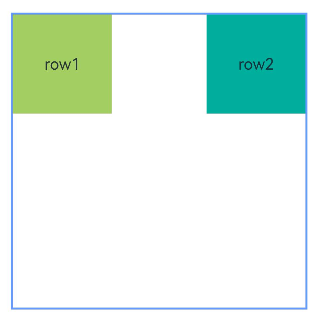
- 以兄弟元素为锚点。
let AlignRus: Record<string, Record<string, string|VerticalAlign|HorizontalAlign>> = {
'top': { 'anchor': '__container__', 'align': VerticalAlign.Top },
'left': { 'anchor': '__container__', 'align': HorizontalAlign.Start }
}
let RelConB: Record<string, Record<string, string|VerticalAlign|HorizontalAlign>> = {
'top': { 'anchor': 'row1', 'align': VerticalAlign.Bottom },
'left': { 'anchor': 'row1', 'align': HorizontalAlign.Start }
}
let Mleft: Record<string, number> = { 'left': 20 }
let BWC: Record<string, number|string> = { 'width': 2, 'color': '#6699FF' }
@Entry
@Component
struct Index {
build() {
RelativeContainer() {
Row() {
Text('row1')
}
.justifyContent(FlexAlign.Center)
.width(100)
.height(100)
.backgroundColor('#00ae9d')
.alignRules(AlignRus)
.id("row1")
Row() {
Text('row2')
}
.justifyContent(FlexAlign.Center)
.width(100)
.height(100)
.backgroundColor('#a3cf62')
.alignRules(RelConB)
.id("row2")
}.width(300).height(300)
.margin(Mleft)
.border(BWC)
}
}
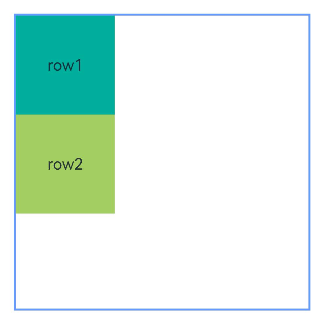
- 子组件锚点可以任意选择,但需注意不要相互依赖。
@Entry
@Component
struct Index {
build() {
Row() {
RelativeContainer() {
Row(){Text('row1')}.justifyContent(FlexAlign.Center).width(100).height(100)
.backgroundColor('#a3cf62')
.alignRules({
top: {anchor: "__container__", align: VerticalAlign.Top},
left: {anchor: "__container__", align: HorizontalAlign.Start}
})
.id("row1")
Row(){Text('row2')}.justifyContent(FlexAlign.Center).width(100)
.backgroundColor('#00ae9d')
.alignRules({
top: {anchor: "__container__", align: VerticalAlign.Top},
right: {anchor: "__container__", align: HorizontalAlign.End},
bottom: {anchor: "row1", align: VerticalAlign.Center},
})
.id("row2")
Row(){Text('row3')}.justifyContent(FlexAlign.Center).height(100)
.backgroundColor('#0a59f7')
.alignRules({
top: {anchor: "row1", align: VerticalAlign.Bottom},
left: {anchor: "row1", align: HorizontalAlign.Start},
right: {anchor: "row2", align: HorizontalAlign.Start}
})
.id("row3")
Row(){Text('row4')}.justifyContent(FlexAlign.Center)
.backgroundColor('#2ca9e0')
.alignRules({
top: {anchor: "row3", align: VerticalAlign.Bottom},
left: {anchor: "row1", align: HorizontalAlign.Center},
right: {anchor: "row2", align: HorizontalAlign.End},
bottom: {anchor: "__container__", align: VerticalAlign.Bottom}
})
.id("row4")
}
.width(300).height(300)
.margin({left: 50})
.border({width:2, color: "#6699FF"})
}
.height('100%')
}
}
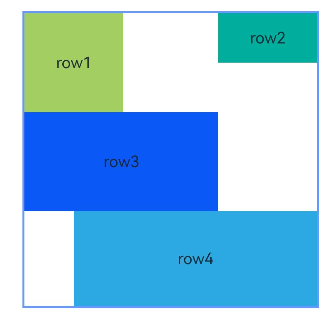
设置相对于锚点的对齐位置
设置了锚点之后,可以通过alignRules属性的align设置相对于锚点的对齐位置。
在水平方向上,对齐位置可以设置为HorizontalAlign.Start、HorizontalAlign.Center、HorizontalAlign.End。

在竖直方向上,对齐位置可以设置为VerticalAlign.Top、VerticalAlign.Center、VerticalAlign.Bottom。

子组件位置偏移
子组件经过相对位置对齐后,可能尚未达到目标位置。开发者可根据需要设置额外偏移(offset)。当使用offset调整位置的组件作为锚点时,对齐位置为设置offset之前的位置。从API Version 11开始,新增了bias对象,建议API Version 11及以后的版本使用bias来设置额外偏移。
@Entry
@Component
struct Index {
build() {
Row() {
RelativeContainer() {
Row() {
Text('row1')
}
.justifyContent(FlexAlign.Center)
.width(100)
.height(100)
.backgroundColor('#a3cf62')
.alignRules({
top: { anchor: "__container__", align: VerticalAlign.Top },
left: { anchor: "__container__", align: HorizontalAlign.Start }
})
.id("row1")
Row() {
Text('row2')
}
.justifyContent(FlexAlign.Center)
.width(100)
.backgroundColor('#00ae9d')
.alignRules({
top: { anchor: "__container__", align: VerticalAlign.Top },
right: { anchor: "__container__", align: HorizontalAlign.End },
bottom: { anchor: "row1", align: VerticalAlign.Center },
})
.offset({
x: -40,
y: -20
})
.id("row2")
Row() {
Text('row3')
}
.justifyContent(FlexAlign.Center)
.height(100)
.backgroundColor('#0a59f7')
.alignRules({
top: { anchor: "row1", align: VerticalAlign.Bottom },
left: { anchor: "row1", align: HorizontalAlign.End },
right: { anchor: "row2", align: HorizontalAlign.Start }
})
.offset({
x: -10,
y: -20
})
.id("row3")
Row() {
Text('row4')
}
.justifyContent(FlexAlign.Center)
.backgroundColor('#2ca9e0')
.alignRules({
top: { anchor: "row3", align: VerticalAlign.Bottom },
bottom: { anchor: "__container__", align: VerticalAlign.Bottom },
left: { anchor: "__container__", align: HorizontalAlign.Start },
right: { anchor: "row1", align: HorizontalAlign.End }
})
.offset({
x: -10,
y: -30
})
.id("row4")
Row() {
Text('row5')
}
.justifyContent(FlexAlign.Center)
.backgroundColor('#30c9f7')
.alignRules({
top: { anchor: "row3", align: VerticalAlign.Bottom },
bottom: { anchor: "__container__", align: VerticalAlign.Bottom },
left: { anchor: "row2", align: HorizontalAlign.Start },
right: { anchor: "row2", align: HorizontalAlign.End }
})
.offset({
x: 10,
y: 20
})
.id("row5")
Row() {
Text('row6')
}
.justifyContent(FlexAlign.Center)
.backgroundColor('#ff33ffb5')
.alignRules({
top: { anchor: "row3", align: VerticalAlign.Bottom },
bottom: { anchor: "row4", align: VerticalAlign.Bottom },
left: { anchor: "row3", align: HorizontalAlign.Start },
right: { anchor: "row3", align: HorizontalAlign.End }
})
.offset({
x: -15,
y: 10
})
.backgroundImagePosition(Alignment.Bottom)
.backgroundImageSize(ImageSize.Cover)
.id("row6")
}
.width(300).height(300)
.margin({ left: 50 })
.border({ width: 2, color: "#6699FF" })
}
.height('100%')
}
}
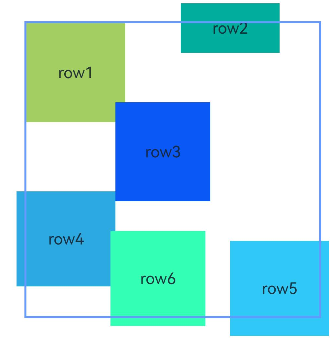
多种组件的对齐布局
Row、Column、Flex、Stack等多种布局组件,可按照RelativeContainer组件规则进行对齐排布。
@Entry
@Component
struct Index {
@State value: number = 0
build() {
Row() {
RelativeContainer() {
Row()
.width(100)
.height(100)
.backgroundColor('#a3cf62')
.alignRules({
top: { anchor: "__container__", align: VerticalAlign.Top },
left: { anchor: "__container__", align: HorizontalAlign.Start }
})
.id("row1")
Column()
.width('50%')
.height(30)
.backgroundColor('#00ae9d')
.alignRules({
top: { anchor: "__container__", align: VerticalAlign.Top },
left: { anchor: "__container__", align: HorizontalAlign.Center }
})
.id("row2")
Flex({ direction: FlexDirection.Row }) {
Text('1').width('20%').height(50).backgroundColor('#0a59f7')
Text('2').width('20%').height(50).backgroundColor('#2ca9e0')
Text('3').width('20%').height(50).backgroundColor('#0a59f7')
Text('4').width('20%').height(50).backgroundColor('#2ca9e0')
}
.padding(10)
.backgroundColor('#30c9f7')
.alignRules({
top: { anchor: "row2", align: VerticalAlign.Bottom },
left: { anchor: "__container__", align: HorizontalAlign.Start },
bottom: { anchor: "__container__", align: VerticalAlign.Center },
right: { anchor: "row2", align: HorizontalAlign.Center }
})
.id("row3")
Stack({ alignContent: Alignment.Bottom }) {
Text('First child, show in bottom').width('90%').height('100%').backgroundColor('#a3cf62').align(Alignment.Top)
Text('Second child, show in top').width('70%').height('60%').backgroundColor('#00ae9d').align(Alignment.Top)
}
.margin({ top: 5 })
.alignRules({
top: { anchor: "row3", align: VerticalAlign.Bottom },
left: { anchor: "__container__", align: HorizontalAlign.Start },
bottom: { anchor: "__container__", align: VerticalAlign.Bottom },
right: { anchor: "row3", align: HorizontalAlign.End }
})
.id("row4")
}
.width(300).height(300)
.margin({ left: 50 })
.border({ width: 2, color: "#6699FF" })
}
.height('100%')
}
}
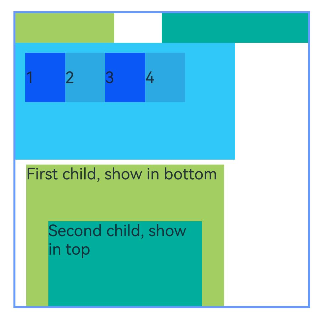
组件尺寸
当同时存在前端页面设置的子组件尺寸和相对布局规则时,子组件的绘制尺寸依据约束规则确定。从API Version 11开始,此规则有所变化,子组件自身设置的尺寸优先级高于相对布局规则中的对齐锚点尺寸。因此,若要使子组件与锚点严格对齐,应仅使用alignRules,避免使用尺寸设置。
说明:
根据约束条件和子组件自身的size属性无法确定子组件的大小,此时,不绘制该子组件。
在同一方向上设置两个或更多锚点时,若这些锚点的位置顺序有误,该子组件将被视为大小为0而不予绘制。
@Entry @Component struct Index { build() { Row() { RelativeContainer() { Row() { Text('row1') } .justifyContent(FlexAlign.Center) .width(100) .height(100) .backgroundColor('#a3cf62') .alignRules({ top: { anchor: "__container__", align: VerticalAlign.Top }, left: { anchor: "__container__", align: HorizontalAlign.Start } }) .id("row1") Row() { Text('row2') } .justifyContent(FlexAlign.Center) .width(100) .backgroundColor('#00ae9d') .alignRules({ top: { anchor: "__container__", align: VerticalAlign.Top }, right: { anchor: "__container__", align: HorizontalAlign.End }, bottom: { anchor: "row1", align: VerticalAlign.Center }, }) .id("row2") Row() { Text('row3') } .justifyContent(FlexAlign.Center) .height(100) .backgroundColor('#0a59f7') .alignRules({ top: { anchor: "row1", align: VerticalAlign.Bottom }, left: { anchor: "row1", align: HorizontalAlign.End }, right: { anchor: "row2", align: HorizontalAlign.Start } }) .id("row3") Row() { Text('row4') }.justifyContent(FlexAlign.Center) .backgroundColor('#2ca9e0') .alignRules({ top: { anchor: "row3", align: VerticalAlign.Bottom }, bottom: { anchor: "__container__", align: VerticalAlign.Bottom }, left: { anchor: "__container__", align: HorizontalAlign.Start }, right: { anchor: "row1", align: HorizontalAlign.End } }) .id("row4") Row() { Text('row5') }.justifyContent(FlexAlign.Center) .backgroundColor('#30c9f7') .alignRules({ top: { anchor: "row3", align: VerticalAlign.Bottom }, bottom: { anchor: "__container__", align: VerticalAlign.Bottom }, left: { anchor: "row2", align: HorizontalAlign.Start }, right: { anchor: "row2", align: HorizontalAlign.End } }) .id("row5") Row() { Text('row6') } .justifyContent(FlexAlign.Center) .backgroundColor('#ff33ffb5') .alignRules({ top: { anchor: "row3", align: VerticalAlign.Bottom }, bottom: { anchor: "row4", align: VerticalAlign.Bottom }, left: { anchor: "row3", align: HorizontalAlign.Start }, right: { anchor: "row3", align: HorizontalAlign.End } }) .id("row6") .backgroundImagePosition(Alignment.Bottom) .backgroundImageSize(ImageSize.Cover) } .width(300).height(300) .margin({ left: 50 }) .border({ width: 2, color: "#6699FF" }) } .height('100%') } }
多个组件形成链
链的形成依赖于组件之间的关联关系。以组件A和组件B构成的最简水平链为例,其依赖关系为:锚点1 <– 组件A <—> 组件B –> 锚点2,即A具有left锚点,B具有right锚点,同时A的right锚点与B的HorizontalAlign.Start对齐,B的left锚点与A的HorizontalAlign.End对齐。 * 链的方向和格式在链头组件的chainMode接口中声明;链内元素的bias属性全部失效,链头元素的bias属性作为整个链的bias生效。链头是指在满足成链规则时链的第一个组件(在水平方向上,从左边开始,镜像语言中从右边开始;在竖直方向上,从上边开始)。 * 如果链内所有元素的size超出链的锚点约束,超出部分将被均匀分配到链的两侧。在Packed链中,可以通过bias设置超出部分的分布。
@Entry
@Component
struct Index {
build() {
Row() {
RelativeContainer() {
Row() {
Text('row1')
}
.justifyContent(FlexAlign.Center)
.width(80)
.height(80)
.backgroundColor('#a3cf62')
.alignRules({
left: { anchor: "__container__", align: HorizontalAlign.Start },
right: { anchor: "row2", align: HorizontalAlign.Start },
top: { anchor: "__container__", align: VerticalAlign.Top }
})
.id("row1")
.chainMode(Axis.Horizontal, ChainStyle.SPREAD)
Row() {
Text('row2')
}
.justifyContent(FlexAlign.Center)
.width(80)
.height(80)
.backgroundColor('#00ae9d')
.alignRules({
left: { anchor: "row1", align: HorizontalAlign.End },
right: { anchor: "row3", align: HorizontalAlign.Start },
top: { anchor: "row1", align: VerticalAlign.Top }
})
.id("row2")
Row() {
Text('row3')
}
.justifyContent(FlexAlign.Center)
.width(80)
.height(80)
.backgroundColor('#0a59f7')
.alignRules({
left: { anchor: "row2", align: HorizontalAlign.End },
right: { anchor: "__container__", align: HorizontalAlign.End },
top: { anchor: "row1", align: VerticalAlign.Top }
})
.id("row3")
Row() {
Text('row4')
}
.justifyContent(FlexAlign.Center)
.width(80)
.height(80)
.backgroundColor('#a3cf62')
.alignRules({
left: { anchor: "__container__", align: HorizontalAlign.Start },
right: { anchor: "row5", align: HorizontalAlign.Start },
center: { anchor: "__container__", align: VerticalAlign.Center }
})
.id("row4")
.chainMode(Axis.Horizontal, ChainStyle.SPREAD_INSIDE)
Row() {
Text('row5')
}
.justifyContent(FlexAlign.Center)
.width(80)
.height(80)
.backgroundColor('#00ae9d')
.alignRules({
left: { anchor: "row4", align: HorizontalAlign.End },
right: { anchor: "row6", align: HorizontalAlign.Start },
top: { anchor: "row4", align: VerticalAlign.Top }
})
.id("row5")
Row() {
Text('row6')
}
.justifyContent(FlexAlign.Center)
.width(80)
.height(80)
.backgroundColor('#0a59f7')
.alignRules({
left: { anchor: "row5", align: HorizontalAlign.End },
right: { anchor: "__container__", align: HorizontalAlign.End },
top: { anchor: "row4", align: VerticalAlign.Top }
})
.id("row6")
Row() {
Text('row7')
}
.justifyContent(FlexAlign.Center)
.width(80)
.height(80)
.backgroundColor('#a3cf62')
.alignRules({
left: { anchor: "__container__", align: HorizontalAlign.Start },
right: { anchor: "row8", align: HorizontalAlign.Start },
bottom: { anchor: "__container__", align: VerticalAlign.Bottom }
})
.id("row7")
.chainMode(Axis.Horizontal, ChainStyle.PACKED)
Row() {
Text('row8')
}
.justifyContent(FlexAlign.Center)
.width(80)
.height(80)
.backgroundColor('#00ae9d')
.alignRules({
left: { anchor: "row7", align: HorizontalAlign.End },
right: { anchor: "row9", align: HorizontalAlign.Start },
top: { anchor: "row7", align: VerticalAlign.Top }
})
.id("row8")
Row() {
Text('row9')
}
.justifyContent(FlexAlign.Center)
.width(80)
.height(80)
.backgroundColor('#0a59f7')
.alignRules({
left: { anchor: "row8", align: HorizontalAlign.End },
right: { anchor: "__container__", align: HorizontalAlign.End },
top: { anchor: "row7", align: VerticalAlign.Top }
})
.id("row9")
}
.width(300).height(300)
.margin({ left: 50 })
.border({ width: 2, color: "#6699FF" })
}
.height('100%')
}
}
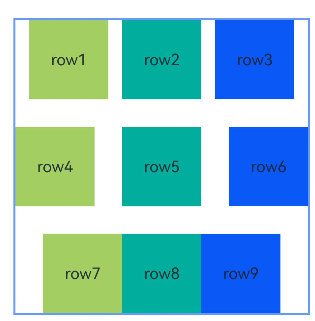
你可能感兴趣的鸿蒙文章
- 所属分类: 后端技术
- 本文标签:
